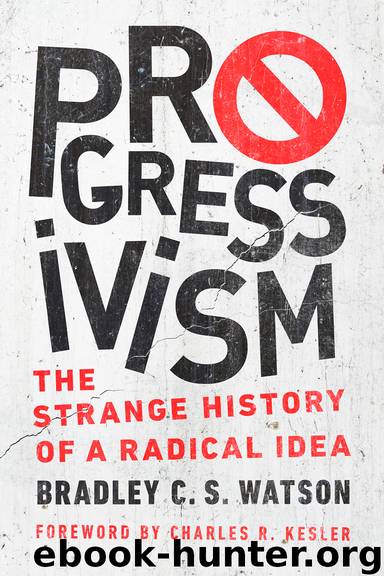Progressivism by Bradley C. S. Watson

Author:Bradley C. S. Watson
Language: eng
Format: epub
Publisher: University of Notre Dame Press
Published: 2020-01-23T16:00:00+00:00
Alas, Higham’s proclamation of the death of the progressive impulse was premature, and his inability to identify the fundamental thrusts of progressivism marks him as perhaps more sympathetic to consensus history than he recognizes.
Finally, Berkeley historian Henry F. May published his influential The End of American Innocence at the very end of the decade. The book traces the role of ideas in the formation of twentieth-century America, with a salutary de-emphasis of socioeconomic causation. According to May, a belief in progress was widely shared by Americans of varying ideological pedigree and was not owned by those who were identified as progressives. But it was progressives who believed they could “speed up” the inevitable; it was they who had the faith that historical forces could and should be stimulated, managed, and directed, and it was this disposition that separated them from their opponents.76 But even while recognizing this disposition, May concurs with Hofstadter that there was an “actual conservatism” to the progressive project, along with a confident moralism. The social gospel called for a return to the Bible, and “some purpose of restoration” of the “sacred institutions” of American government was stated in most secular progressive rhetoric.77 The Progressive Era was “the time when eternal morality and progress seemed to be joined together.”78 May does not make clear that the progressives’ eternal morality bore almost no relation to that of the founders, or to the Constitution they designed to enshrine it. May portrays Woodrow Wilson as a conservative realist, always seeking to link the present with the organic past. Even Wilson’s writings on the problems of committee governance and the prospects for administration as a method and a political principle mark him out, in May’s account, as a realist more than a radical.79
May does identify thoroughgoing relativism in philosophers such as James and Dewey and in social scientists such as Ward, Sumner, Ross, Ely, and Beard. He does not, however, link their thought directly to that of the great progressive political actors of the day, and in some respects he sets the two groups in opposition to each other. He notes that the intellectuals’ relativism played itself out in hostility toward—though not necessarily a repudiation of—“the greatest symbol of American fixity, the Constitution.”80 A decade earlier, he had pointed to the influence of the social gospel on political progressivism and had even suggested that “later in the development of American liberalism, when direct contact with the early Social Gospel is not provable, its influence is still apparent. The moral, ethical, optimistic and fundamental religious strain that runs through a great deal of twentieth-century progressivism could hardly have been developed without the change in religious opinion.”81
This guarded recognition of the depth of the progressive critique of America—something that one finds in Scott as well as May—was stillborn. For the times they were a changin’. As the 1950s gave way to the ’60s, American scholarship was increasingly defined by the concerns of the “New Left.” The deep sympathy of that intellectual coterie with
Download
This site does not store any files on its server. We only index and link to content provided by other sites. Please contact the content providers to delete copyright contents if any and email us, we'll remove relevant links or contents immediately.
| Anarchism | Communism & Socialism |
| Conservatism & Liberalism | Democracy |
| Fascism | Libertarianism |
| Nationalism | Radicalism |
| Utopian |
The Secret History by Donna Tartt(19084)
The Social Justice Warrior Handbook by Lisa De Pasquale(12190)
Thirteen Reasons Why by Jay Asher(8907)
This Is How You Lose Her by Junot Diaz(6885)
Weapons of Math Destruction by Cathy O'Neil(6279)
Zero to One by Peter Thiel(5800)
Beartown by Fredrik Backman(5751)
The Myth of the Strong Leader by Archie Brown(5507)
The Fire Next Time by James Baldwin(5442)
How Democracies Die by Steven Levitsky & Daniel Ziblatt(5218)
Promise Me, Dad by Joe Biden(5153)
Stone's Rules by Roger Stone(5087)
A Higher Loyalty: Truth, Lies, and Leadership by James Comey(4959)
100 Deadly Skills by Clint Emerson(4924)
Rise and Kill First by Ronen Bergman(4788)
Secrecy World by Jake Bernstein(4751)
The David Icke Guide to the Global Conspiracy (and how to end it) by David Icke(4717)
The Farm by Tom Rob Smith(4507)
The Doomsday Machine by Daniel Ellsberg(4490)
